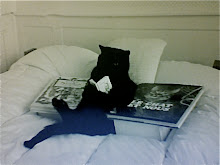If he massacred your dolls when you were children twice (because he found her new hiding place for her toys), it looks like there's no hope for him. Sadly, the protagonist, Ruth, doesn't give up on Azarian even after his grand speech on how he imagines their marriage:
Henry James hated the novel for its 'unrealistic plot', 'unconvincing characters', and abundance of descriptive passages. Focusing on giving Prescott advice (write like French male writers!), James didn't think that the excess in the descriptions could have an ironic quality, or that boredom experienced by the protagonist was quite poignant, not to mention that the two aspects of the novel related to a distinctly different experience than that of French (or American) men.
Azarian would be À rebours à rebours if not for the fact that it was written earlier than Huysmans's novel. Art is an important theme in the novel, but not the "art for art's sake" of the decadent dandy, but the art of women painters (such as Ruth) or women of theater (such as her friend Charmian), or the work of salon hostesses such the mysterious Mme Saratov; art that does not conceal its relationship to money and does not enshroud itself in a veneer of "isolated genius."
The successful artist Ruth believes she has to get married because 'that's just what women do.' As she explains to a well-meaning friend who's trying to warn her about Azarian: "I see what you mean, yet marriage is the natural condition of maturity. Even a bad and selfish man must therefore be a better one if he has a wife If it were question with me ... of marrying such a man as those you knew, I should feel when the dazzle of his days was off how dull and dreary would they wear away. I would bide my time, I would marry him, serve him cheer him, be his slave" (199).
She's tortured by these ideas, driven mad by them to the point when she doesn't realize she's financially independent (her paintings sell extremely well) and that she was much less lonely before Azarian appeared and chased away her friend and love, the actress Charmian.
Azarian is a novel about death of boredom and the delusion of passivity. It's also a novel about women's talent being reduced to craft and fancy rather than artistry and imagination. That's what Azarian does to Ruth and James to Prescott. James accuses her of writing puppets rather than people, but are these categories necessarily mutually exclusive?
Azarian would be À rebours à rebours if not for the fact that it was written earlier than Huysmans's novel. Art is an important theme in the novel, but not the "art for art's sake" of the decadent dandy, but the art of women painters (such as Ruth) or women of theater (such as her friend Charmian), or the work of salon hostesses such the mysterious Mme Saratov; art that does not conceal its relationship to money and does not enshroud itself in a veneer of "isolated genius."
The successful artist Ruth believes she has to get married because 'that's just what women do.' As she explains to a well-meaning friend who's trying to warn her about Azarian: "I see what you mean, yet marriage is the natural condition of maturity. Even a bad and selfish man must therefore be a better one if he has a wife If it were question with me ... of marrying such a man as those you knew, I should feel when the dazzle of his days was off how dull and dreary would they wear away. I would bide my time, I would marry him, serve him cheer him, be his slave" (199).
She's tortured by these ideas, driven mad by them to the point when she doesn't realize she's financially independent (her paintings sell extremely well) and that she was much less lonely before Azarian appeared and chased away her friend and love, the actress Charmian.
Azarian is a novel about death of boredom and the delusion of passivity. It's also a novel about women's talent being reduced to craft and fancy rather than artistry and imagination. That's what Azarian does to Ruth and James to Prescott. James accuses her of writing puppets rather than people, but are these categories necessarily mutually exclusive?
*It's easy to argue with the dead--they don't tend to talk back.




No comments:
Post a Comment